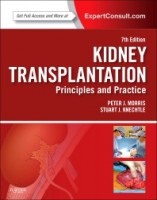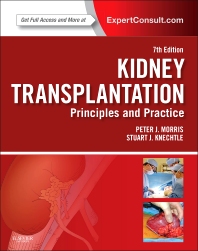 Editors: Peter J. Morris, MD and Stuart J. Knechtle, MD
Editors: Peter J. Morris, MD and Stuart J. Knechtle, MD
Publisher: Elsevier Saunders – 758 pages
Book Review by: Nano Khilnani
In the Preface to the first edition of this book published in 1978, its two editors wrote that the first experimental kidney transplants in animals were reported in Vienna by Dr. Emerich Ullman in 1902. This was followed in 1905 by Dr. Alexis Carrel in the United States. But the problem of rejection was not discussed by either doctor.
Today, kidney transplants have become quite successful and about 30,000 such procedures have been performed, making them relatively common.
This book of 42 chapters written by 82 physicians, surgeons and other specialists in eight countries presents a comprehensive overview as well as details of many aspects of kidney transplantation.
It presents a number of chapters on the history of kidney transplants; reasons for kidney failure; causes of graft rejections; criteria for living donors and care of deceased donors; kidney preservation and preparation for transplants; surgical techniques; and transplant of abnormal bladders.
Chapters on drugs used in transplantation are also provided, particularly on azathioprine, steroids, calcineurin inhibitors, mycophenolates, and mTor inhibitors such as sirolimus and everolimus.
Other chapters on drugs used in renal transplantation are also presented in this book, such as on anti-lymphocyte globulin, monoclonal antibodies, and fusion proteins; belatacept; other forms of immunosuppression,
You’ll learn in this volume, among other subjects, about the approaches to the induction of tolerance; transplantation in the sensitized recipient and across ABO blood groups; kidney paired donation programs ; the pathological kidney; chronic allograft failure; and vascular, lymphatic, and urological complications after kidney transplantation.
Other situations during and after kidney transplantation relating to conditions such as these are also covered in separate chapters: cancer; cardiovascular disorders; diabetic neuropathy; infection; liver disease; neurological complications; pancreatitis; and skin lesions (malignant and benign).
Kidney transplantation in children; in developing countries; results; ethical, legal, and psychological aspects of kidney donation are taken up in others chapters. The final chapter is one on evidence in transplantation.
To access the complete contents of this textbook online – which are fully searchable – and to use the other valuable features, simply visit the website indicated below, enter the Activation Code by scratching off the sticker on the inside front cover of this book, and follow the instructions online to activate your access.
If you are already registered, login at www.expertconsult.com, scratch off the Activation Code on the inside front cover of this book, enter it into the Add a Title box, click on Activate Now, and click the title under My Titles.
If you’re a first-time user, click on Register Now, fill in your user information and click Continue, then activate your book by entering your Activation Code into the Enter Activation Code box; then click on Activate Now, and click the title under My Titles.
An additional resource is available to purchasers of this book on www.ClinicalKey.com
Go to the inside back cover of this text, and you will find that ClinicalKey is designed to serve you well by providing you these important core components:
- Comprehensive Content – The most current, evidence-based answers available for every medical and surgical specialty.
- Trusted Answers – Content supplied by Elsevier, the world’s leading provider of health and science information.
- Unrivaled Speed to Answer – Faster, more relevant clinical answers, so you can spend less time searching and more time caring for patients.
The material for this book was contributed by 82 physicians and medical specialists – most of them in renal medicine, nephrology, immunology, internal medicine, pathology, and transplant surgery – in the United Kingdom and United States and the following other countries: Australia, Belgium, Canada, Germany, The Netherlands, and South Africa,
All of these authors of the chapters, and particularly the book’s editors named below, are to be commended for this valuable book.
Sir Peter J. Morris, MD, PhD, FRS, FRCS is Emeritus Nuffield Professor of Surgery at the University of Oxford; Honorary Professor at the University of London; and Director of the Centre for Evidence in Transplantation at the Royal College of Surgeons of England in London, UK.
Stuart J. Knechtle, MD, FACS is Clinical Director, Professor of Surgery and Pediatrics, and Mason Chair of Transplant Surgery at the Emory Transplant Center in Atlanta, Georgia, USA.







